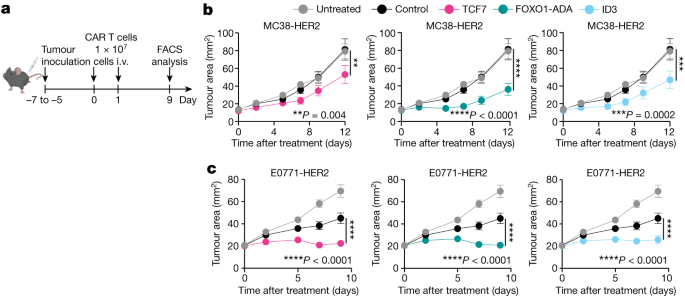Enhancing Chimeric Antigen Receptor (CAR) T Cell Stemness, Metabolic Fitness, and Efficacy through FOXO1 Overexpression
Core Concepts
Overexpression of the transcription factor FOXO1 enhances the stem-like phenotype, mitochondrial fitness, persistence, and therapeutic efficacy of CAR T cells against solid tumors.
Abstract
The content discusses the limitations of chimeric antigen receptor (CAR) T cell therapy in treating solid tumors, which is primarily due to the immunosuppressive tumor microenvironment that leads to poorly persisting and metabolically dysfunctional T cells. Analysis of clinically used anti-CD19 CAR T cells has shown that positive treatment outcomes are associated with a more 'stem-like' phenotype and increased mitochondrial mass.
The authors sought to identify transcription factors that could enhance CAR T cell fitness and efficacy against solid tumors. They found that overexpression of the transcription factor FOXO1 promotes a stem-like phenotype in CAR T cells derived from either healthy human donors or patients. This stem-like phenotype correlates with improved mitochondrial fitness, persistence, and therapeutic efficacy of the CAR T cells in vivo.
The key highlights and insights from the content are:
CAR T cell therapy has transformed the treatment of hematological malignancies but has limited efficacy against solid tumors.
This is due to the immunosuppressive tumor microenvironment that leads to poorly persisting and metabolically dysfunctional T cells.
Positive treatment outcomes with anti-CD19 CAR T cells are associated with a more 'stem-like' phenotype and increased mitochondrial mass.
Overexpression of the transcription factor FOXO1 promotes a stem-like phenotype in CAR T cells, which correlates with improved mitochondrial fitness, persistence, and therapeutic efficacy against solid tumors.
This work reveals an engineering approach to genetically enforce a favorable metabolic phenotype in CAR T cells, which has high translational potential to improve the efficacy of CAR T cell therapy against solid tumors.
FOXO1 enhances CAR T cell stemness, metabolic fitness and efficacy - Nature
Stats
None
Quotes
None
Key Insights Distilled From
by Jack D. Chan... at www.nature.com 04-10-2024
https://www.nature.com/articles/s41586-024-07242-1
Deeper Inquiries
How could the FOXO1-mediated enhancement of CAR T cell stemness and metabolic fitness be further optimized to maximize the therapeutic efficacy against solid tumors?
To further optimize the FOXO1-mediated enhancement of CAR T cell stemness and metabolic fitness for increased therapeutic efficacy against solid tumors, several strategies can be considered. Firstly, fine-tuning the level of FOXO1 overexpression to achieve the optimal balance between stemness and differentiation is crucial. This can be achieved through the use of inducible promoters or gene editing techniques to precisely control FOXO1 expression levels. Additionally, combinatorial approaches involving other transcription factors or signaling pathways that synergize with FOXO1 to enhance CAR T cell function could be explored. Furthermore, incorporating strategies to improve the homing and infiltration of CAR T cells into solid tumors, such as engineering chemokine receptors or utilizing nanoparticles for targeted delivery, can further enhance therapeutic efficacy.
What are the potential limitations or drawbacks of genetically engineering CAR T cells to overexpress FOXO1, and how could these be addressed?
While genetically engineering CAR T cells to overexpress FOXO1 offers promising benefits, there are potential limitations and drawbacks that need to be considered. One limitation is the risk of off-target effects or unintended consequences of FOXO1 overexpression, which could lead to dysregulation of other cellular processes. To address this, rigorous preclinical studies using advanced gene editing technologies like CRISPR/Cas9 can be employed to ensure specific and safe FOXO1 overexpression. Another drawback is the potential for immune rejection of genetically modified CAR T cells, which can be mitigated by using autologous CAR T cells derived from the patient's own cells. Additionally, long-term monitoring of patients receiving FOXO1-engineered CAR T cell therapy is essential to assess any potential adverse effects and ensure safety.
What other transcription factors or molecular pathways could be targeted to improve the persistence and metabolic fitness of CAR T cells in the solid tumor microenvironment?
In addition to FOXO1, several other transcription factors and molecular pathways could be targeted to enhance the persistence and metabolic fitness of CAR T cells in the solid tumor microenvironment. One promising candidate is TCF-1, a transcription factor associated with T cell stemness and memory formation. By modulating TCF-1 expression or activity, CAR T cells could be engineered to exhibit enhanced persistence and self-renewal capacity. Moreover, targeting metabolic pathways such as mTOR or AMPK that regulate cellular metabolism and energy production could improve the metabolic fitness of CAR T cells in the nutrient-deprived tumor microenvironment. Additionally, manipulating immune checkpoint molecules like PD-1 or TIM-3 to prevent T cell exhaustion and enhance effector function could further improve the therapeutic efficacy of CAR T cell therapy against solid tumors.
0
